How to Save Energy and Reduce Electricity Bill in Nigeria
- Reducing your electricity consumption will reflect in your electricity cost and save you some money.
- Electricity bill is one of the many bills that one considers every end of the month and it would only make sense to reduce it.
- Saving energy doesn't have to be difficult and uncomfortable if you follow these simple tips.
PAY ATTENTION: The 2024 Business Leaders Awards Present Entrepreneurs that Change Nigeria for the Better. Check out their Stories!
In a world where electricity distribution companies are continuously hiking electricity tariffs and consumers have to pay high costs, saving energy at home has become more important than ever before.
If you are tired of constantly paying high energy bills and want to start saving money, look no further, as we have got some fantastic tips on how you can save energy and reduce your bills.
By reducing your energy consumption, you would not only save money but also give you peace of mind. Here are some tips on how to save energy at home.

Read also
Buying blocks or moulding my own blocks, which one is cheaper when building a house?" Expert advises

Source: UGC
Turning off the lights when leaving a room
One sure way to reduce electricity consumption in your home is to always turn off the lights when not in a room. It is quite easy to forget to do this every time, but you can cultivate a conscious habit of doing this.
You may never imagine the amount of electricity cost you will be saving by just merely doing this.
Turning the lights off when you leave your room is necessary to help save electricity and lower your utility bills. As a homeowner, turning the lights off when you’re not using them can help save money by reducing your electricity bills, extend the life of your light bulbs, and buy bulbs less often.
Disconnect all energy-draining appliances
It may interest you to know that most electronic appliances drains a significant amount of electricity when they are switched off. One of the simplest ways to save energy is by turning off appliances when not in use.

Read also
"How can I maintain my solar panels and system to get 24/7 electricity in Nigeria?" Expert advises
Leaving electronics plugged in when not in use is one of the most common ways that we waste electricity. This is known as standby power or vampire power, and it can account for up to 10% of your electricity bill.
Unplugging electronics such as TVs, microwaves, video game consoles, standing fans, computers, and chargers when not in use can save a significant amount of electricity and reduce your energy bills.
Opt for energy-efficient appliances
Investing in energy-efficient appliances can also save you money on your energy bills. Look for appliances with an energy-efficient rating, such as A+++ or A++. These appliances use less energy and can save you a lot in electricity costs.
When shopping for appliances, look for features that can help reduce energy consumption. For example, a dishwasher with a delayed start function can be programmed to run during off-peak hours when energy rates are lower.
Additionally, appliances with smart technology can automatically adjust their settings to optimize energy usage and reduce waste.
Use energy-efficient lighting
Switching to energy-efficient lighting can also save you money on your energy bills. LED light bulbs, for example, use up to 90% less energy than traditional incandescent bulbs. They also last longer, so you won't have to replace them as often.
LED is highly energy efficient – less heat, more light, lower cost, according to Integral LED.
Use less electricity for the same light output - 85% less electricity when compared to conventional lighting and around 18% less electricity compared to CFL. Worldwide, around 20% of electricity is consumed in lighting. LED can make a big impact on your energy use.
In addition to LED bulbs, there are other ways to make your lighting more energy-efficient. Installing motion sensors or timers can ensure that lights are only on when they are needed.
Use fans instead of air conditioners
We all love the comfort of having an air conditioner in our homes, but they do not have to come on all the time or else one would have to deal with a high electricity bill.
You can have ceiling or standing fans complement your ACs in your sitting rooms and bedrooms. When the weather is not too hot, you can simply use the fans intermittently with the ACs.
A review by USAToday said that it is significantly more energy-efficient to park yourself in front of a fan than to use an air conditioner. It added:
Fans use around 1% of the electricity consumed by air conditioners. You could leave a fan running for a full 24 hours and still use less energy than 15 minutes of air conditioning.
In conclusion, saving energy doesn't have to be difficult or expensive. By making small changes to your daily routine and using your appliances more efficiently, you can save money and reduce your carbon footprint.
So, take a look around your home today and see where you can make some changes. So, start implementing these tips today and start seeing the savings on your energy bills. Your wallet and the planet will thank you for it!
Nigerians owe N90 billion electricity bill
In a related Legit.ng report, out of every N10 worth of energy sold to Nigerians, as much as N3.47 remained uncollected.
This is according to an analysis of the Nigerian Electricity Regulatory Commission (NERC) latest report.
The report noted over N90.09 billion is been owed by registered electricity consumers for electricity supplied from September to December of 2020.
The amount owed is enough to build a 220-megawatt power plant using global market prices, which puts the cost of building a one-megawatt power plant at $1 million.
That’s more than enough to power all the government’s ministries, departments and agencies and just enough for the homes of 220,000 households or at least one million people with the assumption of four people per household.
PAY ATTENTION: Donate to Legit Charity on Patreon. Your support matters!
Source: Legit.ng





